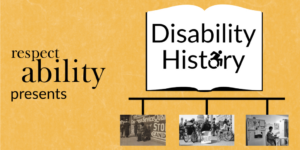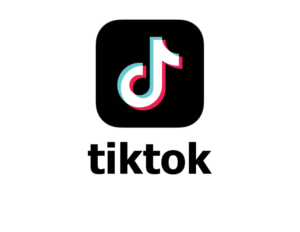Ensuring children with disabilities receive the education and training they need to succeed is vitally important. Nationally, only 65 percent of students with disabilities graduate high school each year compared to 86 percent of student without disabilities. That means there is 21-point gap in outcomes. Furthermore, only seven percent of students with disabilities graduate college. As such, educators have a critical role to play in empowering more students with disabilities to succeed.
Teachers are important partners in the efforts to overcome bias, barriers and stigmas by promoting and implementing best practices in the classroom. Below you will find resources to teach students about disability and assist students with disabilities to succeed. You also will find recommended reading for both children and adults.
RespectAbility’s Disability History Campaign
 Leading up to International Day of Persons with Disabilities 2022, RespectAbility rolled out our Disability History photo series on social media. We hope the images used in this series will serve as a reminder of the progress we’ve made, and motivation for the work that remains.
Leading up to International Day of Persons with Disabilities 2022, RespectAbility rolled out our Disability History photo series on social media. We hope the images used in this series will serve as a reminder of the progress we’ve made, and motivation for the work that remains.
Teacher Resources:
- ADA 30th Anniversary – This website provides a background on the Americans with Disabilities Act (ADA) legislation, its purpose and history. It also covers other legislation regarding rights for people with disabilities.
- ADL Curriculum Connections – The Anti-Defamation League provides lesson plans surrounding all aspects of people with disabilities for all grade levels. This curriculum seeks to challenge the myths and stereotypes that surround people with disabilities.
- A Measure of Perceived Stigma in People with Intellectual Disability – The stigma of intellectual disability is often neglected by health professionals and researchers. Qualitative research has shown that people with intellectual disabilities are aware of the stigma of their disability and its social consequences.
- Judy Heumann movie – Samuel Habib made this video for his final history and English project on the American Dream and the disability rights movement.
- Kids Included Together (KIT) – KIT strives to help the world see the ability in every child. KIT helps others meaningfully include kids with disabilities through inclusion training, policy development and sharing best practices. KIT has created several free inclusion resources including videos, tip sheets, checklists and booklets.
- Museum of disABILITY History: Educational Resources – This site provides extensive lessons plans, with worksheets and readings, on the history of people with disabilities, including the ADA of 1990. The lesson plans based off of the New York State curriculum also includes quizzes and other resources for different age groups.
- Understanding Our Differences – UOD offers disability awareness education programs to third through fifth grade students, with the goal of ensuring that all children understand from an early age that people with disabilities should be respected and included.
- Sesame Street Toolkit – With Julia’s introduction to the cast, Sesame Street can be a great way to talk about disability issues. Julia is a child with autism and openly talks about her experiences in a way that children can understand. Their website showcases many different lessons for young children.
- Special Olympics Unified Champion Schools – This website is dedicated to the Unified Champion Schools program that builds on Special Olympics’ values, principles, practices, experiences and impacts to shape a generation that welcomes everyone. This programming promotes social inclusion in schools to ensure special education and general education students are equitably engaged.
- Special Olympics Unified Champion Schools High School Playbook – This resource provides many tips and resources to make high schools socially inclusive.
- Special Olympics Unified Physical Education Resource – This resource contains information that can be used in a physical education curriculum.
- Stigma and Intellectual Disability: A Review of Related Measures and Future Directions – The theoretical construct of stigma has received much attention in psychiatric disability research, leading to the development of widely used measures to assess stigma change. The study of stigma has not received the much attention for people with intellectual disabilities. This manuscript evaluates existing measures of intellectual disability stigma through a systematic review of the literature.
- Learning for Justice – Learning for Justice showcases the shared struggles and the intersectionality shard by people with disabilities and African Americans. This includes lesson plans for elementary, middle and high school students.
- Who I Am Outreach – This toolkit talks about people with disabilities living life in various roles. Produced by the U.S. Department of Labor Office of Disability Employment Policy, this toolkit includes videos and stories about people with disabilities.
- 20 Tips for Teaching an Accessible Online Course – A resource from DO-IT (Disabilities, Opportunities, Internetworking, and Technology)
Historical Resources:
- Disability and History – This Smithsonian page focuses on people with disabilities throughout history and the historical impact on the American culture around disability.
- IDEA: Individuals with Disabilities Education Act – History & Summary – This video provides a simple overview of the history of IDEA and the struggles of students with disabilities to have the right to a free, appropriate public education protected by law.
- Smithsonian National Museum of American History: The Disability Rights Movement – This online exhibit focuses on the disability rights movement with text, pictures and video to explain various aspects of the movement and the ADA.
- Supreme Court Rules Schools Must Provide More Opportunities for Students with Disabilities – The Supreme Court ruled unanimously (8-0) that schools must do more than provide “merely more than de minimis” education for students with a disability and instead provide them with the opportunity to make “appropriately ambitious” progress.
- Wisconsin Reflecting on 20th Anniversary of ADA – This video illustrates the struggle of passing the ADA, as well as successes and future opportunities for people with disabilities in Wisconsin and across the nation.
Universal Design Resources:
- CAST – CAST is a nonprofit education and development organization that works to expand learning opportunities for all individuals through Universal Design for Learning.
- The UDL Guidelines – The UDL Guidelines are a tool used in the implementation of Universal Design for Learning, a framework to improve and optimize teaching and learning for all people based on scientific insights into how humans learn.
- Meet the Normals – Adventure in Universal Design – This is an animated short that focuses on the process and challenges of universal design.
- UDL Center – The Center for Universal Design for Learning serves as a hub where teachers from all over can share tips, resources and other great tools, which helps spread Universal Design in the classroom. In addition, the site hosts an online version of Universal Design for Learning by David Gordon, Anne Meyer and David Rose.
- Understood.org –This hub possesses great resources for caretakers trying to figure how to navigate the education system. There are tips on how to ensure a universally accessible classroom on the site.
Resources for College Students with Disabilities:
- Association on Higher Education and Disability (AHEAD) – AHEAD is a professional membership organization for individuals involved in the development of policy and in the provision of quality services to meet the needs of persons with disabilities involved in all areas of higher education.
- Center on Postsecondary Education and Disability (CPED) – For more than 25 years, the Center on Postsecondary Education and Disability (CPED) has been a national leader in promoting access to postsecondary education for students with disabilities. Their work combines research-based evidence and professional training to inform the field and advance postsecondary education opportunities for students.
- Disabilities, Opportunities, Internetworking, and Technology (DO-IT) – The DO-IT (Disabilities, Opportunities, Internetworking, and Technology) Center is dedicated to empowering people with disabilities through technology and education. It promotes awareness and accessibility—in both the classroom and the workplace—to maximize the potential of individuals with disabilities and make our communities more vibrant, diverse and inclusive.
- Disability Rights, Education Activism and Mentoring (DREAM) – DREAM (Disability Rights, Education Activism, and Mentoring) is a national organization for and by college students with disabilities. DREAM advocated for disability culture, community and pride, and hopes to serve as an online virtual disability cultural center for students who want to connect with other students. They are supported by sponsoring organization National Center for College Students with Disabilities (NCCSD) and based at the Association on Higher Education And Disability (AHEAD).
- Mason LIFE Program – The Mason LIFE Program is an innovative post-secondary program at George Mason University for young adults with intellectual and developmental disabilities who desire a university experience in a supportive academic environment.
- National Center for College Students with Disabilities (NCCSD) – The National Center for College Students with Disabilities (NCCSD) is a federally funded project under the U.S. Department of Education (P116D150005), through the Fund for the Improvement of Postsecondary Education (FIPSE). NCCSD’s home is at the Association on Higher Education And Disability (AHEAD).
- NBCUniversal Tony Coelho Media Scholarship – Thanks to a contribution from NBCUniversal, the American Association of People with Disabilities (AAPD) offers scholarships to undergraduate and graduate students with disabilities who are interested in pursuing a career in the communications, media or the entertainment industry. Recipients will receive $5,625 to help cover the cost of education at their current college or university.
- Think College – Think College is a national organization dedicated to developing, expanding and improving inclusive higher education options for people with intellectual disabilities. With a commitment to equity and excellence, Think College supports evidence-based and student centered research and practice by generating and sharing knowledge, guiding institutional change, informing public policy, and engaging with students, professionals and families.
Background Reading Resources:
- Bookshare – Bookshare is an accessible online library for individuals with print disabilities, with free memberships available for qualified students and schools. This can be a great resource in the classroom for students with print disabilities with over 200,000 titles on the site.
- Books Written by People with Disabilities – This site lists books that are written by and are about people with disabilities, most being true stories. They offer insight into the lives of people with disabilities and can be used in classroom discussions or book reports.
- Disability in Kid Literature – Disability in Kid Lit looks for and reviews disability representation in children’s literature. Their contributors are people with disabilities who love literature and want to help.
- Goodreads Shelf on People with Disabilities – This site lists popular novels in which the protagonist or other major characters have disabilities.
Recommended Reading for Adults:
- Bernick, Michael S. and Richard Holden. The Autism Job Club: The Neurodiverse Workforce in the New Normal of Employment (Skyhorse Publishing, 2015). The authors review the high unemployment rates among adults with autism and other neuro- diverse conditions more than two decades after the ADA. National data on autism employment and unemployment with the individual employment searches of job club members.
- Brylla, Catalin and Helen Hughes. Documentary and Disability (Palgrave Macmillan, 2017). This edited collection of contributions from media scholars, film practitioners and film historians connects the vibrant fields of documentary and disability studies.
- Burns, David D. Feeling Good: The New Mood Therapy (Harper, 2008). In Feeling Good, eminent psychiatrist, David D. Burns, M.D., outlines the remarkable, scientifically proven techniques that will immediately lift your spirits and help you develop a positive outlook on life.
- Burns, David D. Ten Days to Self-Esteem (William Morrow Paperbacks, 1999). In Ten Days to Self-esteem, Dr. David Burns presents innovative, clear, and compassionate methods that will help you identify the causes of your mood slumps and develop a more positive outlook on life.
- Christensen, Shelly. From Longing to Belonging: A Practical Guide to Including People with Disabilities and Mental Health Conditions in Your Faith Community (Inclusion Innovations, 2018). From Longing to Belonging is a comprehensive approach to inclusion of people with disabilities and mental health conditions written by one of the leading voices in the faith community disability inclusion movement.
- Davis, Lennard J. Enabling Acts: The Hidden Story of How the Americans with Disabilities Act Gave the Largest US Minority Its Rights (Beacon Press, 2015). A gripping and nuanced telling of the behind-the-scenes efforts to pass the Americans with Disabilities Act.
- Donovan, Rich. Unleash Different: Achieving Business Success Through Disability (ECW Press, 2018). Unleash Different illustrates how companies like Google, PepsiCo, and Nordstrom are attracting people with disabilities as customers and as employees.
- Guidotti, Rick. Change How You See, See How You Change (Positive Exposure Productions Inc, 2016). This illustrious and uplifting book explores the near twenty-year journey of Positive Exposure’s founder and award-winning photographer, Rick Guidotti, on his quest to discover the beauty in genetic diversity.
- Kennedy, Dan. Little People: Learning to See the World Through My Daughter’s Eyes (Rodale Books, 2003). In Little People, Dan Kennedy profiles individuals whose small stature has helped them to succeed, and others who have allowed themselves to be exploited and abused.
- Prizant, Barry M. Uniquely Human: A Different Way of Seeing Autism (Simon & Schuster, 2016). Autism therapy typically focuses on ridding individuals of “autistic” symptoms such as difficulties interacting socially, problems in communicating, sensory challenges, and repetitive behavior patterns. Now Dr. Barry M. Prizant offers a new and compelling paradigm: the most successful approaches to autism don’t aim at fixing a person by eliminating symptoms, but rather seeking to understand the individual’s experience and what underlies the behavior.
- Ruh, Debra. Inclusion Branding: Revealing Secrets to Maximize ROI (Ruh Global, LLC, 2018). Revealing step-by-step, chapter-by-chapter strategies brands can implement to effectively include Persons with Disabilities (PWD) into their customer and employee base, tapping into the trillions available through PWD market, Debra Ruh delivers insights and methodologies used in her 30+ years advising and assisting The United Nations, countries, and multi-national corporations.
- Shapiro, Joseph P. No Pity: People with Disabilities Forging a New Civil Rights Movement (Broadway Books, 1994). An historical, in-depth look at people with disabilities. The book also takes a close look at the advocacy efforts that led to the passage of the Americans with Disabilities Act.
- Solomon, Andrew. Far From the Tree: Parents, Children and the Search for Identity (Scribner, 2012). A deeply touching look at how parents and children can learn to accept and embrace differences. The people featured in this book demonstrate how lives with extreme challenges also have extreme value.
Recommended Reading for Children:
- Glatzer, Jenna. Taking Down Syndrome to School (Special Kids in School) (JayJo Books, 2002). Picture book about what it is like to have Down syndrome in school. Appropriate for children in elementary school.
- Ling, Nancy Tupper. My Sister, Alicia May (Pleasant St. Press, 2009). What it’s like to grow up with a sister with Down syndrome. Appropriate for children in first to third grade.
- Llano, Gabriella and Tiziana Vazquez. In My World: Down Syndrome (AuthorHouse, 2013). With the support of her family, a girl with Down syndrome lives her life and learns to accept being herself. Appropriate for children in elementary school.
- Palacio, R.J. Wonder (Knopf Books for Young Readers, 2012). A story about a boy born with facial defects. Appropriate for children ages 8 to 12.
- Paticoff, Melanie. Sophie’s Tales: Overcoming Obstacles (Sophie’s Tales, 2012). A dog with a cochlear implant meets Champ, another dog who wears glasses, and they talk about disability. Appropriate for children ages 3 to 10.
- Robinson Peete, Holly and Ryan Elizabeth Peete. My Brother Charlie (Scholastic Press, 2010). Story told from the point of view of the twin sister of a boy on the autism spectrum. Appropriate for children in kindergarten to second grade.
- Stuve-Bodeen, Stephanie. We’ll Paint the Octopus Red (Woodbine House, 1998). A six-year-old girl learns how to be a good big sister to a baby brother with Down syndrome. Appropriate for children in kindergarten to third grade.
- Woloson, Eliza. My Friend Isabelle (Woodbine House, 2003). Story of a friendship when one of the friends has Down syndrome. Appropriate for children in kindergarten to second grade.
Virtual Education & Students With Disabilities Resource Guide
Whether you are a student with a disability or an adult (parent, guardian, teacher or otherwise) who is championing success for a student with a disability, this guide is for you. Our goal is to be a timesaver for students with disabilities, as well as for the adults in their lives who care about them. This guide includes resources that can help pave the best educational and social-emotional path possible during this pandemic.
Note: This guide was one of several such guides that the team from RespectAbility produced during spring/summer 2020. It was last updated in January 2022.
Do you know other people or nonprofit organizations that should be included as a resource?
Contact our Senior Communications Associate, Eric Ascher, at EricA@RespectAbility.org.
More Resources You Can Use
- Webinars
- Disability Training and Consulting Bureau
- African Americans
- Asian Americans and Pacific Islanders
- Communications, Marketing, and Advertising
- COVID-19
- Employers
- Ending the School-to-Prison Pipeline
- Entertainment Professionals
- Equity and Inclusion
- Faith Inclusion
- Hispanic and Latinx
- Inclusive Philanthropy
- Job Seekers/Entrepreneurship
- LGBTQ+
- Policy Makers
- Sex Education
- Spinal Cord Injuries
- Statistics
- Veterans
- Women









